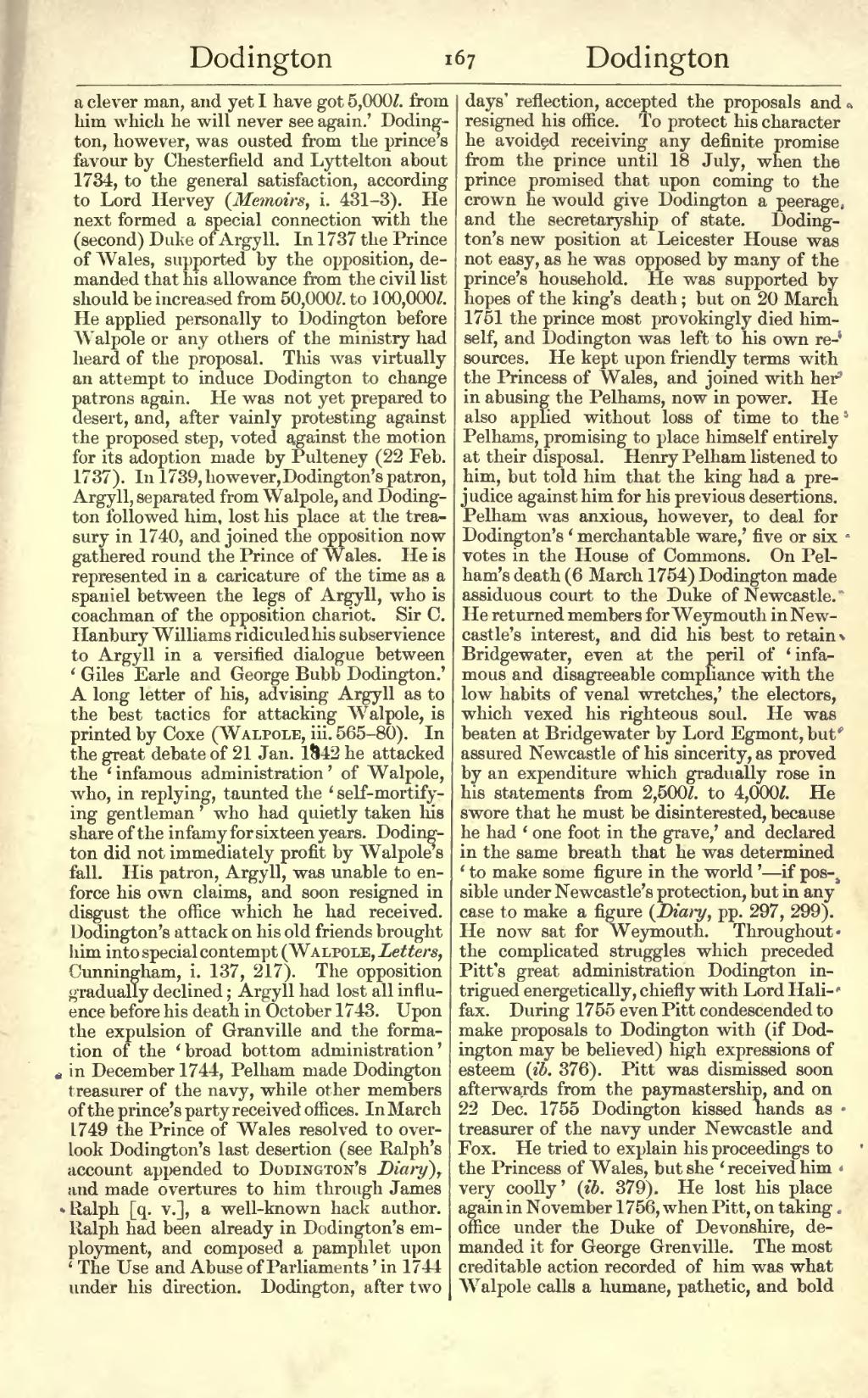a clever man, and yet I have got 5,000l. from him which he will never see again.’ Dodington, however, was ousted from the prince's favour by Chesterfield and Lyttelton about 1734, to the general satisfaction, according to Lord Hervey (Memoirs, i. 431–3). He next formed a special connection with the (second) Duke of Argyll. In 1737 the Prince of Wales, supported by the opposition, demanded that his allowance from the civil list should be increased from 50,000l. to 100,000l. He applied personally to Dodington before Walpole or any others of the ministry had heard of the proposal. This was virtually an attempt to induce Dodington to change patrons again. He was not yet prepared to desert, and, after vainly protesting against the proposed step, voted against the motion for its adoption made by Pulteney (22 Feb. 1737). In 1739, however, Dodington's patron, Argyll, separated from Walpole, and Dodington followed him, lost his place at the treasury in 1740, and joined the opposition now gathered round the Prince of Wales. He is represented in a caricature of the time as a spaniel between the legs of Argyll, who is coachman of the opposition chariot. Sir C. Hanbury Williams ridiculed his subservience to Argyll in a versified dialogue between ‘Giles Earle and George Bubb Dodington.’ A long letter of his, advising Argyll as to the best tactics for attacking Walpole, is printed by Coxe (Walpole, iii. 565–80). In the great debate of 21 Jan. 1742 he attacked the ‘infamous administration’ of Walpole, who, in replying, taunted the ‘self-mortifying gentleman’ who had quietly taken his share of the infamy for sixteen years. Dodington did not immediately profit by Walpole's fall. His patron, Argyll, was unable to enforce his own claims, and soon resigned in disgust the office which he had received. Dodington's attack on his old friends brought him into special contempt (Walpole, Letters, Cunningham, i. 137, 217). The opposition gradually declined; Argyll had lost all influence before his death in October 1743. Upon the expulsion of Granville and the formation of the ‘broad bottom administration’ in December 1744, Pelham made Dodington treasurer of the navy, while other members of the prince's party received offices. In March 1749 the Prince of Wales resolved to overlook Dodington's last desertion (see Ralph's account appended to Dodington's Diary), and made overtures to him through James Ralph [q. v.], a well-known hack author. Ralph had been already in Dodington's employment, and composed a pamphlet upon ‘The Use and Abuse of Parliaments’ in 1744 under his direction. Dodington, after two days' reflection, accepted the proposals and resigned his office. To protect his character he avoided receiving any definite promise from the prince until 18 July, when the prince promised that upon coming to the crown he would give Dodington a peerage and the secretaryship of state. Dodington's new position at Leicester House was not easy, as he was opposed by many of the prince's household. He was supported by hopes of the king's death; but on 20 March 1751 the prince most provokingly died himself, and Dodington was left to his own resources. He kept upon friendly terms with the Princess of Wales, and joined with her in abusing the Pelhams, now in power. He also applied without loss of time to the Pelhams, promising to place himself entirely at their disposal. Henry Pelham listened to him, but told him that the king had a prejudice against him for his previous desertions. Pelham was anxious, however, to deal for Dodington's ‘merchantable ware,’ five or six votes in the House of Commons. On Pelham's death (6 March 1754) Dodington made assiduous court to the Duke of Newcastle. He returned members for Weymouth in Newcastle's interest, and did his best to retain Bridgewater, even at the peril of ‘infamous and disagreeable compliance with the low habits of venal wretches,’ the electors, which vexed his righteous soul. He was beaten at Bridgewater by Lord Egmont, but assured Newcastle of his sincerity, as proved by an expenditure which gradually rose in his statements from 2,500l. to 4,000l. He swore that he must be disinterested, because he had ‘one foot in the grave,’ and declared in the same breath that he was determined ‘to make some figure in the world’—if possible under Newcastle's protection, but in any case to make a figure (Diary, pp. 297, 299). He now sat for Weymouth. Throughout the complicated struggles which preceded Pitt's great administration Dodington intrigued energetically, chiefly with Lord Halifax. During 1755 even Pitt condescended to make proposals to Dodington with (if Dodington may be believed) high expressions of esteem (ib. 376). Pitt was dismissed soon afterwards from the paymastership, and on 22 Dec. 1755 Dodington kissed hands as treasurer of the navy under Newcastle and Fox. He tried to explain his proceedings to the Princess of Wales, but she ‘received him very coolly’ (ib. 379). He lost his place again in November 1756, when Pitt, on taking office under the Duke of Devonshire, demanded it for George Grenville. The most creditable action recorded of him was what Walpole calls a humane, pathetic, and bold
Page:Dictionary of National Biography volume 15.djvu/173
